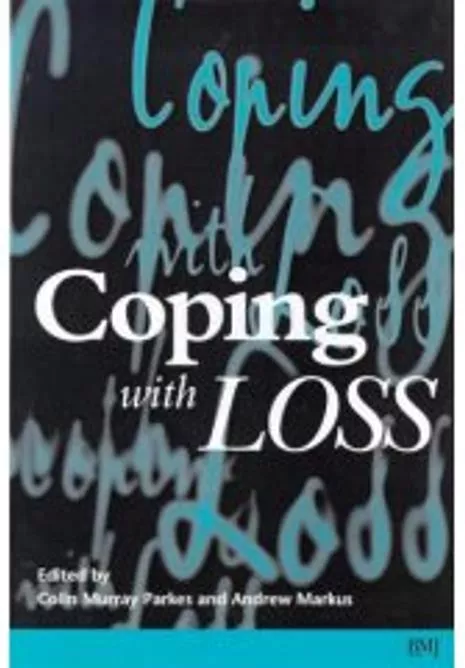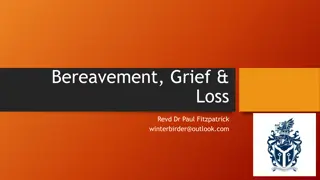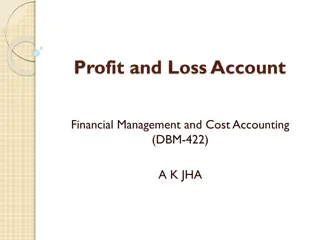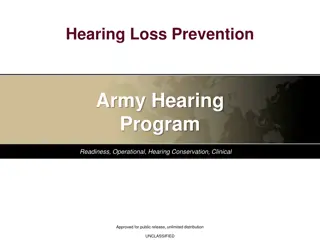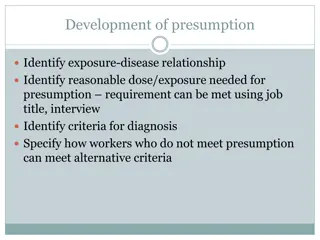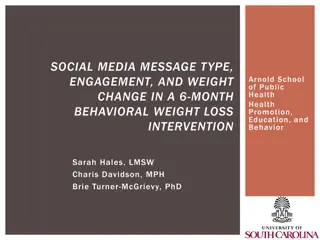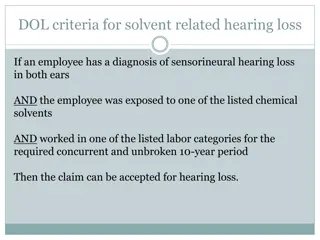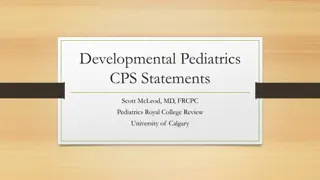Loss: Types, Activities, Consequences
Loss is an inevitable part of life encompassing various experiences like dissolved relationships, separation, and death. It can be defined as parting with something valuable, leading to personal pain and disruption. This article explores different types of loss, tangible and intangible, along with activities and consequences associated with it. It delves into feelings and thoughts related to loss, primary appraisal, and feelings such as loneliness, anger, guilt, and more.
Download Presentation

Please find below an Image/Link to download the presentation.
The content on the website is provided AS IS for your information and personal use only. It may not be sold, licensed, or shared on other websites without obtaining consent from the author.If you encounter any issues during the download, it is possible that the publisher has removed the file from their server.
You are allowed to download the files provided on this website for personal or commercial use, subject to the condition that they are used lawfully. All files are the property of their respective owners.
The content on the website is provided AS IS for your information and personal use only. It may not be sold, licensed, or shared on other websites without obtaining consent from the author.
E N D
Presentation Transcript
Tutor: Yipsir () www.yipsir.com.hk
Loss - An inevitable part of life - Encompasses: dissolved relationship separation death
Loss Defined Loss is the experience of parting with an object, person, belief, or relationship that one values. Losses are encountered daily by each of us. The experience of loss is likely to accompany by personal pain and disruption. Losses can be minor or major. The designation of minor or major depends upon the perception of the loss by the person experiencing the loss. The impact of loss depends upon the value the person placed on what was lost. 1. 2. 3. 4.
Types of Loss Tangible (actual or physical) losses are apparent and easily recognized: 1. Loss of a body part 2. Changes in physical health 3. Loss of personal belongings Intangible (perceived or psychological) losses are less obvious: 1. May be tied to personal perceptions such as one s prestige, power, dreams, plans, security, etc. 2. Because these losses are less likely to be acknowledged, admitting to the accompanying feelings of loss can be difficult or embarrassing. 3. Consequently, emotional support may be inadequate.
Activity - Sharing of a loss case / experience (Self or others) 1. Loss a parent of a secondary student. 2. Loss a significant peer 3. Loss of a loved one
Thoughts, Memories and Experiences related to LOSSES ( W7-1) 1. What are some of your earlier memories, feelings, and experiences surrounding sickness, separation, death or dying? 2. Who did these experiences involve? 3. How did you handle the loss? 4. Have you ever killed living things? 5. What are you thoughts about killings now? 6. What other questions might you ask or encourage others to explore in this exercise? 7. What have you learnt from this experience?
Primary appraisal 1. Worth getting upset about? Yes, worthy of grief As most losses are upsetting and needs appropriate grieving process
Consequences of Loss Normal and pathological (Feelings, thoughts and behaviours)
Feelings associated with loss 1. Loneliness 2. Anger 3. Guilt 4. Relief 5. Sadness 6. Anxiety 7. Fatigue 8. Shock
Physical reactions Hollowness in the stomach 1. Tightness in the chest 2. Tightness in the throat 3. Oversensitivity to noise 4. Shortness of breath 5. Weakness of muscles 6. Dry mouth 7. Lack of energy 8.
Thoughts 1. Disbelief (1ststage) 2. Confusion (take a break or keep busy, which is better?) 3. Preoccupation (2ndstage) 4. Imagination (wish to return to the past, same as 3)
Behaviours 1. Trouble in sleeping 2. Eating difficulty 3. Social withdrawal 4. Dreaming 5. Polar activity level 6. Crying ? Catharsis total emotion release, resume energy
Questions for rethinking Who may suffer more from loss: kids, youngsters or adults? 1. Did you and should you prepare yourself for the inevitability of experiencing losses in life? 2.
5 Stages of Grief () in Loss Event Denial-Shock Shock, disbelief, numbness Bargaining Shop around, risk taking, sacrifice Anger Yearning and searching Despair Despair and disorganization Acceptance give up false hopes accept the reality make plans to get on with your life 1. 2. 3. 4. 5.
Characteristics of Stages of Grief 1. Loss process can last anywhere from 3 months to 3 years 2. Stages are normal & to be expected 3. It is healthier to accept these stages & recognize them for what they are rather than to fight them off or to ignore them 4. Working out each stage of loss response ensures return to adaptive functioning 5. Outside support during grieving process assists gaining objectivity & understanding. emotional health &
Faces of Denial in Loss 1. Magical thinking: believing by magic loss will go away 2. Excessive fantasy: believing nothing is wrong- loss is just imagined-when wake up everything will be OK 3. Regression: act childlike & want others to reassure that nothing is wrong 4. Withdrawal: avoid facing loss & avoid those people who confront with truth 5. Rejection: reject truth & those who bring news of loss to avoid facing loss
Faces of Bargaining in Loss (health problem) 1. Shop around: looking for right agent with cure for loss 2. Gamble: take chances on cures for loss 3. Risk Taking: put self in jeopardy financially, emotionally & physically to get to an answer or cure for loss 4. Sacrifice: in our pursuit of a cure to change loss ignore real personal needs
Faces of Anger in Loss 1. Self-blaming: blame self for loss 2. Switching blame: blame others for this loss 3. Blaming the victim: blame the victim for leaving us 4. Aggressive anger: believing have right to vent blame & rage aggressively on closest target 5. Resentment: believing our hurt & pain is justified to turn into resentment towards those involved in loss event including victim
Faces of Despair in Loss 1. Guilt: believing personally responsible for loss 2. Remorse: feel sorry for real or perceived bad past deeds for which this loss is some form of retribution or punishment 3. Loss of hope: so overwhelmed that have no hope of being able to return to calm & order our life held prior to loss 4. Loss of faith & trust: can no longer trust belief in goodness & mercy of God & mankind
Faces of Acceptance in Loss 1. Rational thinking: refute irrational beliefs or fantasy thinking in order to address loss from rational perspective 2. Adaptive behavior: adjust lives to incorporate changes necessary after loss 3. Appropriate emotions: express emotional responses freely & are better able to verbalize pain, hurt & suffering experienced 4. Patience and self-understanding: recognize it takes time to adjust to loss & give selves time to deal with it by setting realistic time frame in which to learn to cope with changes 5. Self-confidence: see stages of loss as natural & expected & gain confidence needed for growth
Coping With Loss 1. Grief ( ) is the reaction to loss and encompasses thoughts and feelings, as well as physical and behavioral responses 2. Mourning ( ) is closely related to grief and refers to the process by which a person adjusts to loss and incorporates this into their life 3. William Worden has identified 4 tasks when mourning Accepting the reality of loss Working through the pain Adjusting to a change environment Emotionally relocating the deceased and moving on
Steps for Coping 1. Talk about your feelings: Good friends, religious or spiritual care providers or family members can be good sources of support. Reach out to others - this will help reduce feelings of isolation. 2. Join a support group: Support opportunity to share with other caregivers and learn from one another. For those who feel isolated by their caregiving responsibilities, you can join a group by attending in person, or via the Internet. groups provide caregivers with the
Steps For Coping 3. Write your feelings down: Writing or journaling is not for everyone. For individuals who enjoy writing, it can be a wonderful way to express feeling of loss and grief. It doesn t matter what you write or how you spell the process of putting your feelings down on paper is what s most important, not what the end result looks like. 4. Read a book on coping with grief: There are several books available on the issues of caregiving, self-help, grieving and loss.
Steps For Coping 5. Make time for yourself: Do what works for you. For some individuals that may mean time spent with friends, family members or participating in a group. Others may need time alone. There are still others who need something. You may need to garden, plant tree, or go for a walk. to spend time doing Do whatever it takes to express your feelings so you continue doing the things that are important to you.
Steps For Coping 6. Get Help when needed: Coping with changes or loss is a lot like adjusting to a broken arm. You may experience pain, and you may need assistance dealing with this pain. You may need help with meeting the demands of caregiving. If available, family and friends can provide some of the assistance you may need at this time. There are also professionals available for hire. The Internet is another resource for finding help nationally and in your community. Community organizations are a great resource for various types of help.
Steps For Coping 7. Learning how to let go Be philosophical: the gratification you received from a love relationship is a benefit / bonus of life, not a right. Replace the missing nurturance Thought stopping globing labelling facts & feeling Positive self-statement Stimulus control Optimistic thinking Saying your final good-bye ( implosion day )
Constructive and unconstructive grief work Negative Positive Acceptance for events you cannot change Focus on what ifs Looking for an explanation Finding a meaning for death
How to offer support to the loser Helpful responses expressing genuine caring and concern allowing the griever to express feelings being available when needed offering the opportunity for activities spending time with people who have similar exp. 1. Unhelpful responses offering advice encouraging a positive outlook interfering in the griever s life downplaying the griever s loss 2.
When to do What? Grieving stages Intervention caring and concern allowing expression of feelings being available when needed offering the opportunity for activities spending time with people who have similar exp. Deny Anger Depress philosophical sharing, problem- solving Rebuild
Death Defined 1. Death has been defined as cessation of the flow of vital bodily fluids 2. This occurs when the heart stops beating and breathing ceases 3. The concept of cellular brain death involves the following: Lack of receptivity and response to external stimuli Absence of spontaneous muscular movement and spontaneous breathing Absence of observable reflexes Absence of brain activity (EEG)
What are the meanings for death? 1. Death helps us savour life. 2. Death reveals the importance of intimacy in our lives. 3. Death help us us ascribe meaning to our lives retroactively, especially useful for older people. 4. Death allows us to see our achievements as having significance.
Other positive views on death 1. Positive view: 2. Negative view: life is full of misery, he died Question: What is the appropriate time to do this philosophical sharing?
Denying vs. Welcoming Death 1. Many people seek to avoid any mention of death 2. The saying, out of sight, out of mind appears to be the rule compared to facing death directly 3. Problems can arise when the avoidance or denial that death can happen to you
Planning For Death 1. Accepting that death will occur allows the ability to plan for this event 2. Basic tasks may include: Making a Will Considering options for End-of-Life care Home Care Hospital based Care (palliative care) Hospice Programs
Planning a Funeral 1. A funeral are rites of passage that commemorate a person s life and acknowledge their existence provide a survivors to support one another as they cope with the loss and express grief 2. Funerals framework that allows 3. The following need to be addressed when planning a funeral Disposition of the body Service Arrangement
Healthy Coping with Death 1. Fully grieve resulting loss 2. Deal with denial of reality of death & reality of loss it brings 3. Cease bargaining behavior being used to deny reality of death & reality of resulting loss. 4. Work out anger over death & resulting loss 5. Handle despair & depression resulting from death & resulting loss
Healthy Coping with Death 1. Let go of person, event or object in death & face resulting loss 2. Handle fears about death & resulting loss 3. Look at death in an open-honest way-not hide from, avoid or ignore it 4. Accept its inevitability in your life & lives of others 5. Accept changes that are consequence of death
Aspen Tree Trunks The End




